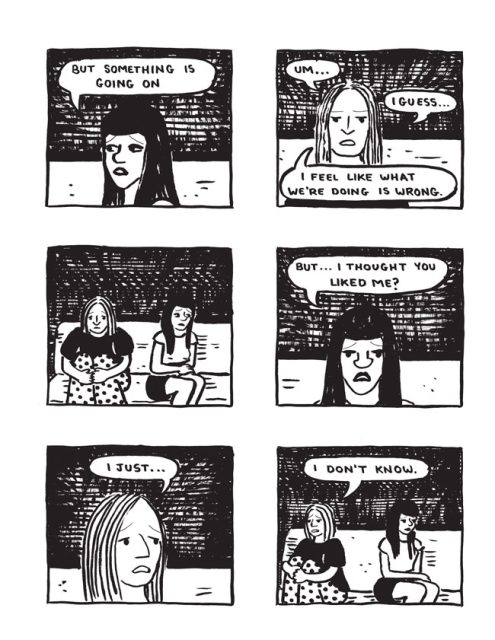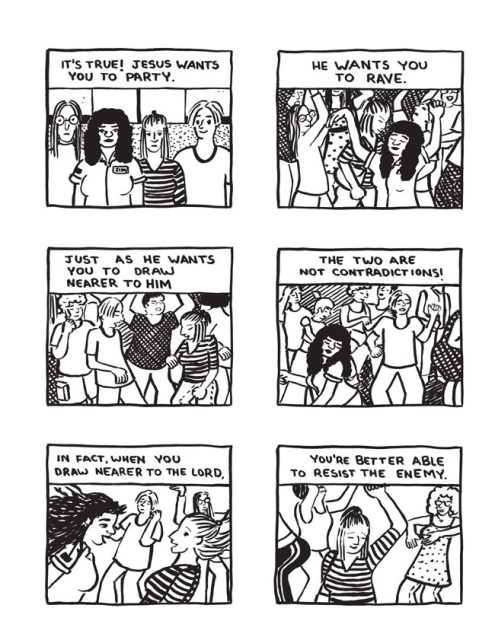Jessica Campbell’s latest is a marked departure from her two previous, delightfully smart-assed books, XTC69 (2018) and Hot or Not: 20th Century Male Artists (2016). While those books deftly satirized misogyny and sexism, Rave is a far more sober-sided affair—though certainly not without a sense of humor. Here Campbell proves herself more than capable of nuanced, contemplative storytelling.
Using her trademarked thick-brush, funky-friendly linework, Campbell explores the devastating effects a rigid religious doctrine has on her heroine, a timid 15-year old high school student named Lauren, circa early 2000’s.
Campbell opens with Lauren attending a youth group at her evangelical church. The pastor begins with a sermon called “Remaining a pure bride of Christ,” which instantly clues us in to Lauren’s circumstances. She dresses in dowdy full-length skirts (with hairstyle to match), and possesses a world-class unibrow. But Lauren’s repressed/suppressed life gets considerably livened up when, for a high school class project on evolution, she is partnered with a schoolmate named Mariah. Mariah is Lauren’s polar opposite: bold, sassy, seemingly uncaring as to what others might think of her. She also identifies as Wiccan. Lauren’s parents won’t even let Lauren bring books about evolution into the house.
When Mariah’s mother decides to spend the weekend away with her boyfriend—leaving Mariah to her own devices, without a second thought—the girls plan a study date/sleepover at Mariah’s apartment. During the sleepover Mariah gives Lauren a makeover and Lauren ends up looking really cute. Eventually, the girls engage in a little make-out session, then spend the rest of the evening cuddling together in front of the television. Their romance continues for a while afterward, but Lauren’s evangelical background has left her ill-prepared for this intimacy. As she feared, there will be consequences.

Campbell’s deadpan observations of teenage shenanigans strengthen the narrative throughout, and she accurately captures the random banalities and cruelties of high school life. We see Lauren gossiping with a friend about creepy teachers; getting razzed (“You suck!”) while participating in a super-geeky song and dance number for a school show; and witnessing the all-too-common bullying in the school’s halls. Campbell nails kids’ awareness that their social standing is tenuous, that any faux pas could mean disaster—as when Lauren’s secret relationship with Mariah is suspected by an unsympathetic classmate.

Meanwhile, back at her church youth group, Lauren is bombarded from the pulpit with negative messages about sex–especially homosexuality. Campbell drives home that the church seems bent on controlling its subjects, as in the aforementioned opening scene in which the pastor goads his visibly pregnant teenage daughter, Amber, up to the podium to testify about accepting God’s love. Doing so is deeply humiliating for Amber, which may very well be her father’s intention. She ultimately comes across as a victim, paraded about as an example of straying from acceptable behavior. None of the teens involved in the church seem to get any strength or comfort from any of its teachings. (To be fair, Mariah’s Wiccan practice doesn’t in the end seem to bring her much comfort, either).
The climactic rave of the book’s title is surprisingly—and perhaps, incongruently—sponsored by Lauren’s church. The host of the event does indeed exhort the teens to have fun, but on very specific terms: “Jesus wants you to party. He wants you to rave (...) As you dance, as you celebrate the Lord tonight (...) Remember that your body is not your own (...) you are on time borrowed from God.” Campbell cleverly juxtaposes this spiel with the action at the rave, zeroing in on boys pressuring girls to drink and make out—all of which is directly opposite of what the church expects from these youthful members of its flock. The combination of teenage hormones with repressive religious doctrine creates a powerful disconnect, leading to a genuinely shocking plot turn.
Rave ends as it began, with yet another sermon at the youth group, featuring some classic religious scapegoating (promiscuity and liberalism in particular). After all that has happened, Lauren is left at a crossroads, contemplating her path forward with the church. Like her peers, she is a part of the church simply because she was born into and has grown up with it. It’s all she’s known.
Ultimately, I don’t believe Campbell’s book is anti-religion. I think she simply questions the role religion has in shaping impressionable minds. At heart it is a protest against the damage wrought by doctrines that tout forgiveness and acceptance—but earned only after swift judgment and punishment have been meted out. Rave is a thoughtful, painful coming-of-age tale with gravitas, wrapped in a deceptively charming package.








